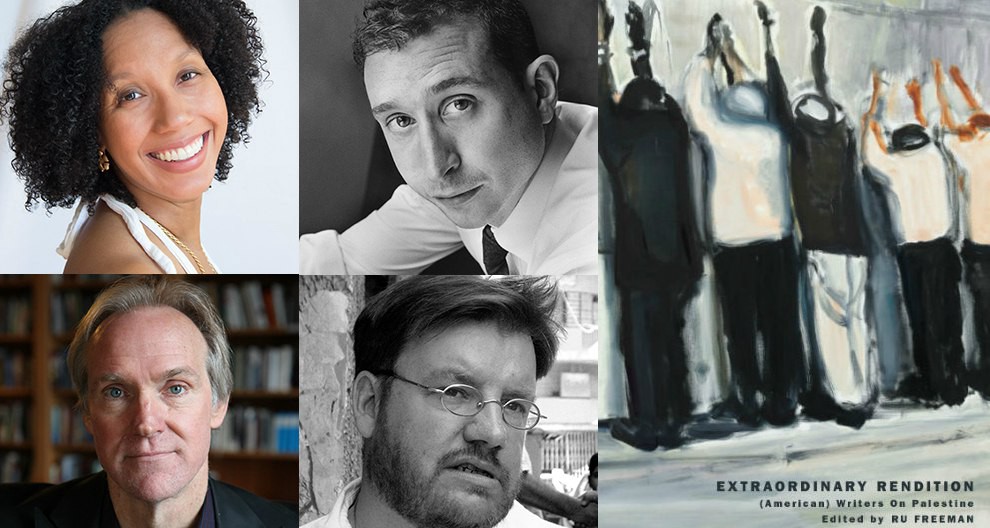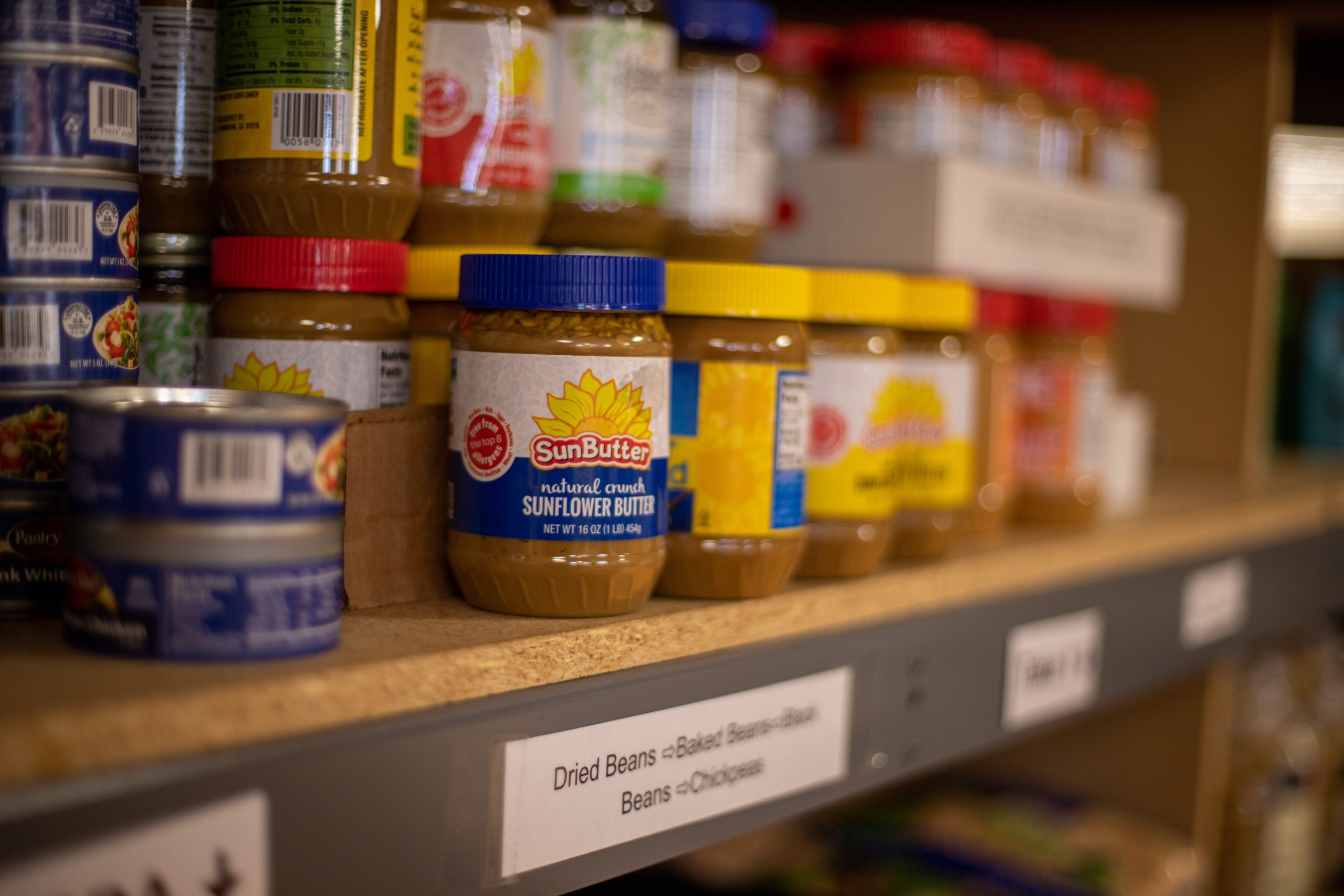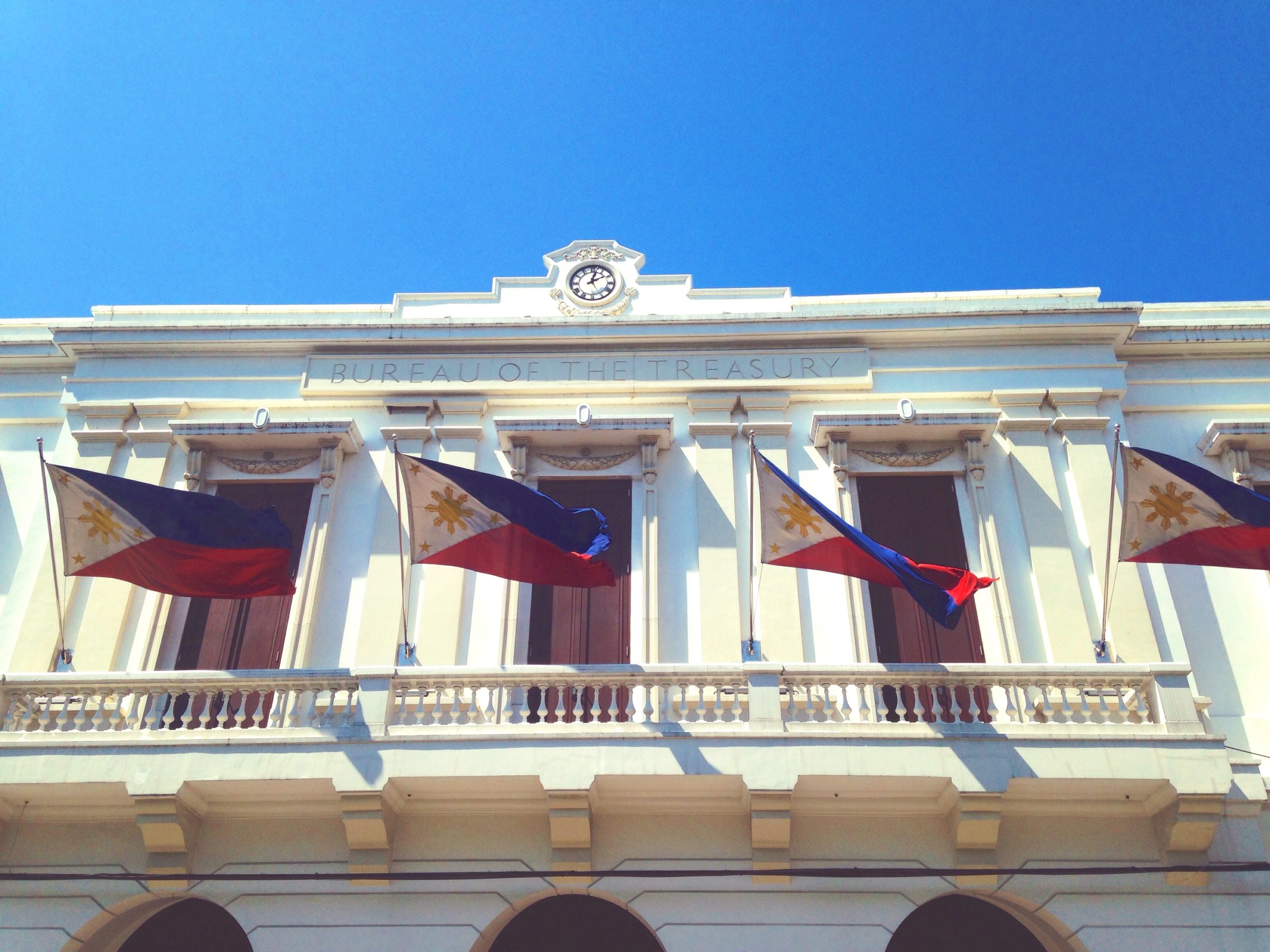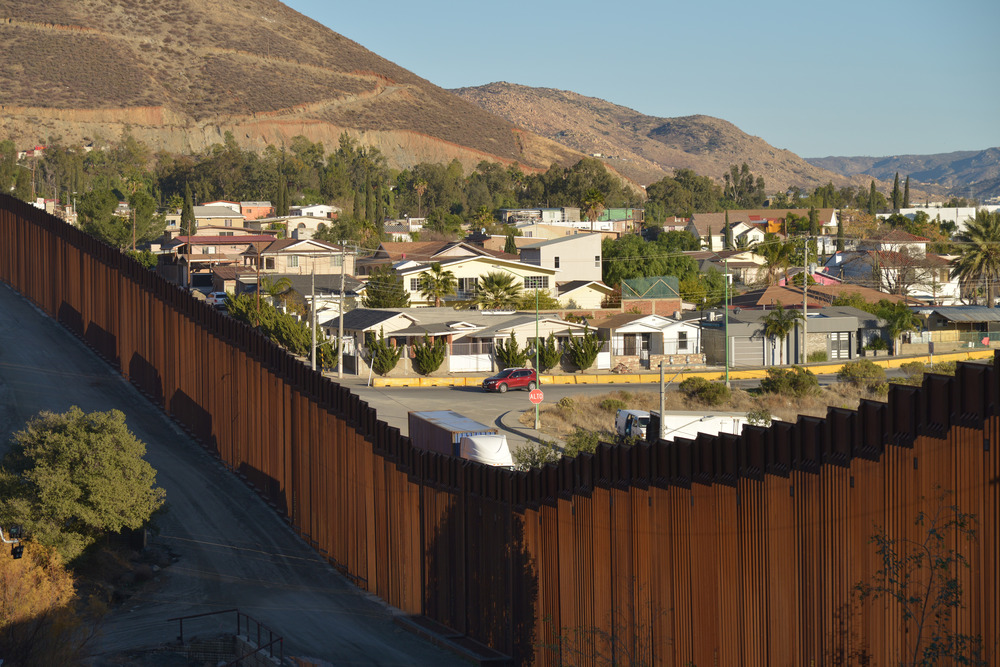interviews
A Conversation About American Writers & Palestine

Last month, OR Books released Extraordinary Rendition: (American) Writers on Palestine. The anthology, edited by the novelist Ru Freeman, includes contributions from a host of esteemed writers, including George Saunders, Colum McCann, Nathalie Handal, Teju Cole, and Claire Messud. In Freeman’s introduction, she writes that she was inspired by a tradition of anthologies that asked authors to lend their voices to the important conflicts of the day: first, Nancy Cunard and W. H. Auden’s Authors Take Sides on the Spanish Civil War (Left Review, 1937), then, thirty years later, Simon and Schuster’s, Authors Take Sides on Vietnam (Peter Owen, 1967). “In 2014,” Freeman writes, believing that it was no longer possible “to take no side,” she asked “for a simple show of hands. Who might speak for Palestine?”
On the book’s release, Freeman and several of the collection’s sixty-five contributors met in New York City at the Center for Fiction to discuss the project and to read from their work. While the standing-room crowd filed into the Center, I sat down with Tiphanie Yannique, Sinan Antoon, Tom Sleigh, and Jason Schneiderman to discuss their contributions to the anthology, the urgency of continuing the tradition of literary activism, and the difficulties of writing about complex and ongoing political issues.
Dwyer Murphy: Discussing Palestine poses so many difficult issues, but it seems to me that for writers, in particular, there’s one very fundamental difficulty: the words themselves. Deciding which name to call a town, a community, a people, or how to describe an historical event, what was done and to whom — those are important, politically charged decisions. How daunting is it to write when the words themselves are so controversial?
Sinan Antoon: I have to say, I have a problem with the way the word “controversial” is used in this country. ‘Controversial’ is usually code for something that needs to be believed in silence. A lot about this conflict is not controversial, even in Israel itself. But in this country, we have a different ceiling for certain debates and discussions. I don’t think this topic is controversial. Rather, it’s urgent and necessary.
Maybe it’s old-fashioned to believe, but as writers and as citizens, we have a responsibility.
Another thing I would point out is this myth that’s prevalent amongst our peers. They think, “Well, I’m a writer, but I’m not political.” As far as I’m concerned, there is power everywhere in the world, so everything is political in various degrees. Maybe it’s old-fashioned to believe, but as writers and as citizens, we have a responsibility. We’re representing the world and representing it in a certain way. I don’t believe in this myth of neutrality.
Tiphanie Yanique: Neutrality is its own stance, of course.
Sinan Antoon: Yes. A political stance.
Tiphanie Yanique: Still, I know a number of people were anxious about contributing to this anthology and maybe chose not to. It’s one thing to have a conversation about this with your friends, where you’re bitching about how you feel and being honest about things. It’s a whole other thing to put it in writing. There’s more pressure to say something definitive when you’re writing, and your words may be recalled years later. You may even be quoted. Your actual choice of words becomes so key. And I think writers — especially writers — are afraid of that.
That said, I agree with you, Sinan: whenever you write, you write politics. Even if you say to yourself, “I’m not going to write about policy,” or “I’m not going to write about race or gender,” that in itself is a political stance.
So this pretense, of not being political, is nice and self-protective, but it’s bullshit.
As a fiction writer, whenever you have characters, your characters have bodies, races, genitalia, sexual preferences. That automatically puts politics on the table. So this pretense, of not being political, is nice and self-protective, but it’s bullshit.
Tom Sleigh: I’ll answer differently because, well, you ask about terminology. I’ve done a lot of journalism in Lebanon and Syria and Iraq and also, most recently, in Libya. I find that when you’re moving from town to town, all you need to do is say the word “Nakba,” for example, which in Arabic means “catastrophe” and also refers to the 1948 expulsion, which the Israelis call the War of Independence. There’s this vast web of claims and counterclaims.
When you’re writing about this region, I think what you have to do is realize that you’re stepping into an incredibly complicated, super nuanced situation. For me, at least, I want to do everything I can to have the most fine-grained understanding of what it is I’m saying, and also to be very upfront about what it is I don’t know.
Dwyer Murphy: Jason, your contribution looks at the ways in which we don’t talk about the conflict, how the conversation sometimes seems impossible.
Jason Schneiderman: Well, this is more consequential than most other conflicts. Just a few years ago, there was the kerfuffle with Tony Kushner and CUNY over his views on Israel. Decades ago, it was other prominent writers. As an American Jew, raised with a Jewish education, it can feel like Israel and the Holocaust are the primary things that define what it is to be Jewish. And that doesn’t work anymore. There has been, I think, over the past decade or two, an effort to redefine Jewishness, because the old definitions just don’t work anymore.
…the vast majority of the conversations I’ve heard about this subject have refused to acknowledge the humanity of the other side
But the vast majority of the conversations I’ve heard about this subject have refused to acknowledge the humanity of the other side. My rabbi goes to Israel every year and gives a report to the synagogue. The report offers a complicated understanding of what’s going on: the people, the checkpoints, etc. And basically the responses to the report fall into two categories: “I can never join your synagogue because you’re supporting our enemies,” and “Israel is a colonial project and has no right to exist.”
I’ve found it’s very difficult to speak from somewhere between those two positions.
And so my essay is about not wanting to speak about the conflict, because the conversation feels so un-nuanced. It feels almost useless.
Sinan Antoon: What you’re describing — the stark difference between those positions — is the problem with Zionism. (And I’ve learned more about Zionism’s problems from American Jewish intellectuals than from any other group.) Saying that Israel is a colonial state doesn’t also mean denying the humanity of Israelis. Critiquing the structure of the Israeli state doesn’t also mean denying that it has a right to exist. This is a problem for a lot of Americans. Perhaps because this country, in its formation, has —
Tiphanie Yanique: A very similar legacy.
Sinan Antoon: — an identical legacy. With Native Americans. With African Americans. For example, a lot of the activists from Black Lives Matter traveled to Palestine. And a lot of the Palestinian activists came to this country. They feel they have a lot in common: in their struggles, in the silence around the issue, in the erasure they face. That says something. We should be able to recognize that a colonial settler state, like this state and like Israel, has committed injustices against its population. Unless we recognize what that means and what are the costs and the traumas, nothing will change.
Tiphanie Yanique: That brings to mind an article that was published by an anthropology association here in the US comparing the language used to describe the Palestine-Israel conflict with the language used to describe what was happening in South Africa during the apartheid era. We tend to think, “Oh South Africa is done. We knew what was the right thing was there. If I had been around I would have been on the right side of history.” We all think that. But, according to the study, the language is exactly the same kind, in some cases, sentence-for-sentence. The justifications used to explain why it was okay to oppress Africans in South Africa is the same language being used to explain why it’s okay oppress — I’ll use the word oppress — Palestinians in Palestine. When you see the language side-by-side, it’s not that complex. We look at our history, and it’s pretty simple to know what is injustice and what is not.
Sinan Antoon: We have, both in American and in Israel, a continuous shock and an expression of innocence: we are post-racial, post-Zionist. Well, of course, if you’re at the top of society, and you have all the privileges, and land is appropriated and you can live on it with taxpayer money coming from the United States, of course it’s post-Zionist. But not for the victims of the project — those in the West Bank and in Gaza, but also the Palestinians inside Israel who live, for all intents and purposes, like second-class citizens, and whose land is still being appropriated for settlements as we speak. The excerpt I translated is from a novel by a Palestinian living inside Israel who sees the country disappearing. It’s not finished. This is happening still.
Dwyer Murphy: We’ve been talking about an obligation to speak out, but there’s also the question of who has the right to speak. For an outsider — or at any rate, one who is neither Palestinian nor Israeli — there’s always the question of authority. Someone will come along and ask, basically, who do you think you are? Is that something that you had to grapple with in deciding whether and how to contribute to the anthology?
Sinan Antoon: This is not about writing scholarship or history. This is fiction and poetry. On so many other issues in the world, American writers have no qualms about pontificating and legislating and telling people what to do. But when it comes to this, Palestine, they refuse. It’s not about lack of knowledge. It’s about a certain taboo because of geopolitics, and because of internal politics here in America. You don’t have to be Palestinian to write about that. We are American citizens. For 65 years, our government has subsidized the Israeli occupation. We have a responsibility. I do not want my taxpayer money funding bulldozers and tanks that decimate and kill people. That’s very simple. That’s not controversial, and it doesn’t require a lot of knowledge. It’s actually quite simple.
…you look at the shell casings of the 2006 bomb, and it’s damn clear that it was made in the United States. These things aren’t that distant to Americans.
Tom Sleigh: On that point, my essay in the anthology is about Quneitra, in the Golan Heights, where there was a massacre in 1996 and another in 2006. I use the word “massacre” by the way. Talk about a contested word, although I don’t know how else you’d call dropping a bomb — artillery shell — on a UN compound where civilians are gathered. And of course, you look at the shell casings of the 2006 bomb, and it’s damn clear that it was made in the United States. These things aren’t that distant to Americans.
Tiphanie Yanique: But I think it feels distant to a lot of people, especially those who claim, “I don’t know enough about this.” That’s supposedly why they’re unable to take a stance. They say, “This has been going on for a thousand years. Since the Bible! I’m not Israeli, I’m not Palestinian, I’m not even part of that world. I don’t have the right to write about this, I don’t have the right to have an opinion about this.”
And when you do voice your opinion, there will be folks disagreeing with you who will automatically respond, “You don’t know enough about this. You’re not a part of this history and therefore you can’t contribute.”
Sinan Antoon: This conflict is 120 years old, but in America we always hear this idea that it’s thousands of years old, it’s about religion. That’s a recipe for continuous disaster. The conflict is about land. In the sixties and seventies, it wasn’t about Islam. It was about Marxism and land: who has the land, who took away the land, who lost the land, and compensation for the lost land.
Tiphanie Yanique: Once the issue is framed as religion, you have to be super sensitive, which allows you to have no opinion and to remove yourself from the debate.
Our fears keep us from taking a stance. And that fear comes from concrete privilege. It is a privilege to not have have an opinion.
As a woman color, I’m sensitive to this. People in power — men, white men, or even white women — have made too many swath-like judgments from the outside. And I think there’s a fear — as liberals, as progressives, especially if we’re coming from the majority space — that we can’t have an opinion on people who are Other to us. We’re scared to have an opinion and perhaps be oppressive simply by taking a stance. And the result is often that we allow disaster and unfairness and catastrophe and incredible injustices to occur, because we’re afraid that we might seem to be racist or homophobic or anti-Islam or anti-Semitic. Our fears keep us from taking a stance. And that fear comes from concrete privilege. It is a privilege to not have have an opinion. It is a privilege to know injustice is occurring and to continue on your merry way.
Dwyer Murphy: I’d like to discuss a figure, Mahmoud Darwish, who looms over much of the work in this book. I expect many American readers won’t be familiar with his poetry, yet it seems, in reading these poems and essays and stories, that it’s almost impossible to approach the region and the conflict, from a literary perspective, without coming to some understanding of Darwish and his influence.
Sinan Antoon: He’s one of the most important poets of the last fifty years, not because of politics but because of form and innovation. Just looking at his life, we see the issues that won’t go away. He was born in a village at Galilee. At age six, his village was destroyed by the Israeli army, and he was forced to go to Lebanon, as a refugee. When he came back from Lebanon to his country, Israeli law designated these returnees as present absentees — it didn’t recognize them. So he lived in a village next to his old village, which was now destroyed. He lived with the ruins of his previous life. This was in a period when Palestinians were not recognized. Golda Meir said in the Times that there were no Palestinians. So, much of Darwish’s early poetry was very nationalist. For a society that was displaced, without a state, that poetry was very important. It anchored a collective identity.
So much of this discourse is about erasure.
But then what’s really fascinating about Darwish is that after he became a national poet, mythologizing the land and becoming himself a myth, he deconstructed his own myths. And in that deconstruction, he prepared the nation to begin to understand its problems. In 1967 he wrote a poem to his friend Shlomo Sand, the Israeli scholar, who was going to fight in the ’67 war. It’s an amazing poem — a poem addressed to the enemy, his friend. And yet, in the 1990s, when a leftist minister introduced a bill to the Knesset that would have brought Darwish’s work into Israeli schools, the bill was refused. They said Israel was not ready for Mr. Darwish’s poetry. So much of this discourse is about erasure.
Tom Sleigh: There’s one poem that I think is particularly interesting in this context, called “Murdered and Unknown.” It’s a really strange poem, because it doesn’t do any of the things you think it’s going to do. It’s a conversation, either in the self or between two people. There’s a lot of grass imagery. It’s all brown grass — this ain’t Walt Whitman with his regenerative grass that’s going to unify everybody; it’s dead, brown grass on the roadside. And there are these two voices. One voice says, “I am the victim.” And the other says, “No, I alone am the victim. “ So you have this strange moment in a lyric poem, which is clearly both memorializing and satirizing the collective wound. That seems to me a really powerful, interesting place to approach these problems from. That’s one of the things I like about Darwish. He crystallizes a certain kind of complexity of thought.
Sinan Antoon: He humanizes the enemy.
Tom Sleigh: Absolutely.
Dwyer Murphy: The book is titled Extraordinary Rendition: (American) Writers on Palestine. Without knowing each of your nationalities and identities, I wonder if any of you were reluctant to take on that role of “American writer,” or to be seen as speaking on behalf of Americans?
What do you do when you love a set of ideals that has become a nation, when you know the narrative occludes suffering?
Jason Schneiderman: The “American” part wasn’t complicated for me. In fact, it felt extremely parallel, because of the questions we’re asking: What do you do with a beautiful dream that’s built out of a nightmare? What do you do when you love a set of ideals that has become a nation, when you know the narrative occludes suffering? How do you bring those things together? For me, those questions make up the central crisis of being a United States citizen.
Tiphanie Yanique: I found the “American” part fascinating. I don’t think I totally recognized that that’s what we were being asked to participate in. I’m from the Virgin Islands, and we are effectively a colony of the United States. When I came to the US for college, I realized that while I was carrying an American passport and was an American citizen, culturally I was immigrating to my own country. This place was incredibly foreign, and I was treated as a foreigner.
In the piece I wrote for the anthology, I use some of that personal history. I make it very clear that I’m writing from a place called St. Thomas, St. Croix, St. John. These places, and my upbringing, become metaphors, which I use to talk about the conflict.
My biography is very complex. My parents weren’t married. My grandparents weren’t either. One part of my family is very wealthy, very established, and another part, the part that I’m from, is poor and less established. I was effectively a bastard twice over, for two generations. I found myself often ending up in spaces where my right to belong was called into question. “Who you belong to again? Oooooh.. Shhhhhh.” I was the secret, outside child. So I used that to talk about the conflict.
But the “American” title gave me pause, because I often do not identify as an American writer, although the world sometimes tells me “Oh, by the way, you’re an American writer,” or, “No, you’re not an American writer.” In the US, if anyone knows who the hell I am, they know me as a fiction writer. In the Caribbean, if anyone knows who the hell I am, they know me as a poet. I relate to people with separate identities. So it gave me pause, that American title. But it also allowed me to talk more effectively about what I wanted to discuss — issues of bastardization and colonialism. .
In terms of being an American, there’s not a whole lot of nuance that’s available with that term and the way in which it plays in other countries.
Tom Sleigh: One of the most interesting, and shocking and terrifying things about going to Lebanon was discovering that people there (or in Libya or Syria) say, “Well, American policy and Israeli policy are identical. There is no difference.” The assumption is, you’re American, you must agree with this policy. You can say whatever you want, but the fact of the matter is, it’s a widespread perception. That’s not just from policy-wonk people, but from everyone I talked to, top to bottom. They said, “Yeah, of course, everybody knows that.” In terms of being an American, there’s not a whole lot of nuance that’s available with that term and the way in which it plays in other countries. That’s one reason why a book like this is, I think, so important. If it’s read in other countries, other people might see it and think, “Oh, well, these people aren’t as stupid, or as united, as I thought they were.”
Sinan Antoon: I was born in Iraq, to an Iraqi father and an American mother, and lived there for twenty-three years. Before 9/11 and before the wars, I was struck that in the region, people always differentiated between government and peoples. It struck me, when I came to this country, that people here often say “we,” meaning 350 million people, Congress, the President… Before the “us” and “them” and the Bush years and all of that, there was more nuance in Iraq and in the region because people knew that you didn’t represent your government. I would say, sarcastically, that one advantage of living in a non-democracy is that you realize something: there are the people, and then there is the regime. But here people say “we.” It’s uncritical and very problematic. That’s why a book like this one is important. If you say “we,” and you think “we,” and you think that the “we” includes the government, then you’re responsible for what is done in the name of the “we.”
Or you say, “Not in my name.” There isn’t much we can do, but at least we can say, “That doesn’t represent me. The government doesn’t represent me.”
Ru Freeman and contributors, including Tess Gallagher, Peter Mountford, and Alice Rothchild, will read from and discuss Extraordinary Rendition: (American) Writers on Palestine tonight (January 7th) at Elliot Bay Books in Seattle.









